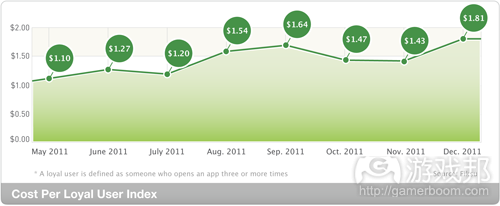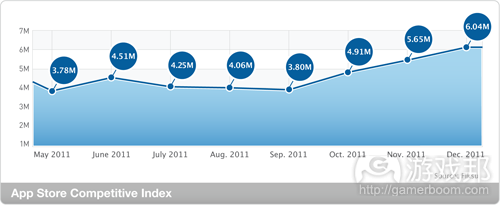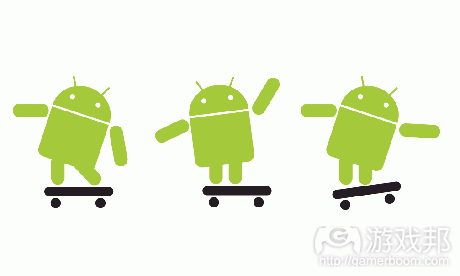每日观察:关注HTML5与Flash技术优劣对比(2.1)
1)Fiksu最近监测数据显示,2011年12月份iOS平台应用营销成本再度攀升,开发者获取忠实用户(至少开启三次应用的用户)的成本上涨至1.81美元,比上月增长26.5%;美国iPhone免费应用榜单前200名应用平均每日下载量达604万次,同比上月的565万下载量增长7%。
Fiksu报告称由于苹果在圣诞节当周暂停应用商店审核及更新,开发者在12月份最后一周的营销投入及流量均双倍增长,因为众开发者都希望利用这一时期让应用居于榜单前列,以便在圣诞节期间获得足够的曝光度。
2)据Korea Herald报道,韩国网游公司Nexon计划合并其智能手机业务子公司Nexon Mobile,以便扩大手机游戏业务,更灵活地针对移动平台开发游戏。这两者目前已签署协议,将于今年4月份进行合并。
3)独立开发商Team Meat(《超级食肉男孩》开发商)联合首席执行官Edmund McMillen在最近媒体采访中表示,公司下个产品可能是iPhone游戏,但值得注意的是,该公司成员Tommy Refenes曾在2010年3月发布博文表示,他“无意开发任何与iPhone和iPad有关的游戏,并且很讨厌iOS平台及其应用商店”,他将“开发Mac版本的《超级食肉男孩》”,他情愿开发Android版游戏也不愿意推出iPhone版本,但总体而言,“手机设备绝非通用的游戏平台”。
而McMillen对此则表示,他们将在一个月内开始动工,新项目很可能是一款iPhone游戏,除非它真的很糟糕,他们才会取消项目并转向开发更大型的游戏。
4)在今年的移动游戏论坛(Mobile Games Forum)上,ComScore副总裁Jeremy Copp指出,iOS仍是开发者最关注的移动平台,但谷歌代表Laurence Aderemi则表示,Android发展极为迅速,Android将获得更多游戏
开发者的支持,其优势包括:
*Android移动设备的多种价格选择有助于该平台占领更多市场份额。
*50%的Android热门应用属于游戏产品。
*虽然iOS用户粘性数值(14.7)比所有手机平台的平均值(7.8)更高,但Android用户粘性也达到了9.3。
*Android用户一般在早上和午餐时间短暂体验游戏,但深夜是他们玩游戏的高峰期。
但观察者认为,针对Android平台开发游戏也存在三大不容忽视的挑战:
*硬件问题——开发者选择过多,难以用同一套标准满足广泛的市场需求。
*平台分裂——Android应用商店种类过多,导致开发者的产品难以获得足够的曝光度。
*售价较低——Android平台以免费增值游戏为主,它们占据65%的收益比例,而iOS平台免费增值游戏的收益所占比例为50%。
5)Android开发者博客作者Scott Main最近指出,出现于Android 3.0(Honeycomb)移动设备的菜单按钮(Menu)实际上并不适用于Android 3.0及Android 4.0(Ice Cream Sandwich)平板电脑及手机设备,原因是它会导致应用程序的菜单选项与action-overflow菜单脱节,从而影响用户体验。
Main表示,假如应用程序并没有使用任何菜单选项,那么这种按钮就不会对其产生影响,所以开发者最好升级应用,移除相关设置。
6)Flash游戏网站OneMoreLevel.com最近发布了一份HTML5与Flash对比信息图,其主要数据包括(如下图所示):
目前采用HTML5技术开发的游戏仅有数百款,而基于Flash的游戏超过了10万款。
HTML5技术目前所覆盖用户超过8亿,而Flash则达到了20亿以上用户。
仅40%的网页浏览器可兼容HTML5技术,但99%浏览器都支持Flash。
HTML5技术传输内容需使用多个文件,而Flash仅需一个SWF格式的文件。
HTML5技术目前所能提供的功能取决于浏览器,声音和3D支持功能均受到限制,而Flash的技术要求是安装插件,也存在3D支持受限的缺陷。
从Mac操作系统的主流浏览器运行效果来看:HTML5在Safari上运行性能最佳,并且消耗的CPU(12.39%)低于Flash,而Flash 10.0版本所占用CPU达到37.41%,Flash 10.1版本占用32%;这两者在谷歌Chrome浏览器上运行效果都不甚理想(需均占用50%的CPU);Flash在火狐浏览器上运行效果略逊于Safari,但优于在Chrome的情况。
从Windows操作系统的主流浏览器运行效果来看:Flash 10.0在IE8上要占用22.41%的CPU,Flash 10.1占用14.62%;Safari无法播放基于HTML5的视频内容,而Flash 10.0在这一浏览器上仅用CPU为23.22%,Flash 10.1仅需用7.43%的CPU;Flash Player 10.0在谷歌Chrome上的重播效率比HTML5高24%,Flash Player 10.1则比HTML5高58%;Flash 10.1在火狐上占用的CPU仅6%,而Flash 10.0则是22%。
目前多数Facebook游戏采用Flash开发技术,但有许多游戏正使用HTML5开发项目或重写代码。
(本文为游戏邦/gamerboom.com编译,拒绝任何不保留版权的转载,如需转载请联系:游戏邦)
1)Christmas sends mobile marketing costs to a record, Fiksu says
Kim-Mai Cutler
Apple’s blowout $46.3 billion quarter turned out to be pretty expensive for iOS developers too.
Fiksu, a company that helps developers find the most cost-effective ways to acquire users, says marketing costs rose to a record in December as companies spent aggressively to lock-up the top of the charts.
The cost to acquire a loyal user (or one that opens an app three times) rose to $1.81, up 26.5 percent from the previous month. The top 200 free iPhone apps also saw an average of 6.04 million downloads a day in the U.S., up 7 percent from the previous month’s 5.65 million record.
A spending binge in the middle of the month was critical because Apple freezes app store submissions and updates during Christmas week. Fiksu’s says spending and traffic doubled in the final week of December as studios competed to have their apps in front of consumer eyes on Christmas Day.
Indeed, Flurry said a quarter of a billion apps were downloaded on Christmas Day alone last year as many consumer unwrapped iPhones as presents and then searched for apps to try out.
These numbers also underscore a few trends we’ve seen seeing. Again, the iPhone 4S launch plus the holiday quarter is helping narrow the gap between Android pick-up and the iOS platform, giving developers yet another reason beyond easy monetization to stay with Apple’s platform. Secondly, holiday marketing is maturing. We saw Electronic Arts, Gameloft, Big Fish Games and more duke it out through holiday sales while more freemium-oriented developers also discounted their virtual currency.(source:insidemobileapps)
2)Nexon merging with its mobile affiliate studio
by Mike Rose
Newsbrief: Online game publisher Nexon is set to merge with its smartphone affiliate Nexon Mobile, as a means of boosting its mobile game offerings.
According to a report from the Korea Herald, the two companies have signed an agreement, and are due to merge in April of this year.
Nexon’s chief executive Seo Min explained that mobile games are going to becomes a core portion of the Nexon business, and that by merging the two companies, Nexon will now be able to make more active use of its various IPs for mobile. (source:gamasutra)
3)Super Meat Boy developer Team Meat’s next game will ‘probably’ be for the iPhone
by Anthony Usher
Co-CEO of Super Meat Boy creator Team Meat Edmund McMillen has announced in an interview with website IndieGames.com that Team Meat’s next release may be an iPhone title, despite his company’s dislike of the App Store.
What do we mean?
Well, in a blog post back in March 2010, Team Meat’s Tommy Refenes had some pretty choice words to say about Apple, its App Store, and gaming on mobile phones.
“I have no intentions on doing anything for iPhone or iPad ever… I hate the platforms and I hate the stores. I will end up doing a Mac version of Super Meat Boy, but thankfully that isn’t sold through their (Apple’s) crappy AppStore [sic],” Refenes said.
“You are more likely to see Super Meat Boy on an Android phone then [sic] you are to see Super Meat Boy on an iPhone, but you won’t see it on any phone because A PHONE IS NOT A GENERIC GAMING PLATFORM.”
Times change
Still, in spite of the comments above, it looks like the independent developer’s next game will grace Apple’s digital store, after all.
Asked by IndieGames.com about forthcoming titles, McMillen responded: “I can say that Tommy has been working his ass off, and has finished the exporter. Our games from now on will all be vector based, which means really high resolution, HD, crisp, clean graphics, that will run even better.”
“I imagine probably in a month we’ll start working full time on development of the next game. The next game will probably be iPhone. Probably. Unless it sucks, then we’ll can it and focus on the big game.”(source:pocketgamer)
4)Seven reasons why you will develop for Android (and three reasons why it will be challenging)
Zoya Street
At the Mobile Games Forum this year, it was clear that the landscape of platforms for games development had changed dramatically in the past year. One year ago, feature phones were still relevant in the US and EU, but now smartphones dominate, making up 59% of new mobile phone sales according to Jeremy Copp at CommScore. Developers have until now been focused on iOS as the primary mobile platform, but Laurence Aderemi from Google argued that Android has grown rapidly, and looks like an increasingly promising prospect for game developers. Here’s why.
1.Jeremy Copp showed that Android’s market share in the EU has grown from 8.3% to 26.2%, while Apple’s share has stayed fairly constant at around 20%.
2.Laurence Aderemi pointed out that the varying price points of Android handsets will lead to considerably more rapid growth in Android’s market share than other platforms.
3.Aderemi also reported that more than 50% of the top Android apps are games.
4.iOS users present double the average engagement rate – 14.7 compared to 7.8 – but Android is also higher than average at 9.3, according to Aderemi
5.Android users play games briefly in the morning and at lunchtime, but the most heavy use is in the late evening, indicating that mobile gameplay is eating into console gameplay times.
6.The dominance of evening use means that mobile devices are being used in the household, supporting the idea that people are sharing devices with their families, which creates a more diverse market, according to Ross Sleight at Somo.
7.Perhaps responding to some of the concerns raised at the Social Games Summit last autumn, Aderemi insisted that payments are getting easier on Android, with direct carrier billing integration now announced with 19 carriers.
However, Android brings its own challenges that have many developers concerned.
1.Hardware – developing an app for all Android devices is unrealistic. Developers have to choose which hardware to support, balancing higher capabilities against greater market share.
2.Fragmentation – since users can buy apps for Android from more than one store, finding your customers is more difficult. Oscar Clark from Papaya advised that developers use social networks to market their game directly to their audience, rather than relying on storefronts for promotion. The Spilt Milk Studios posts offer first-hand advice on selling a mobile game.
3.Lower price points – freemium games dominate on Android devices – they consitute 65% of all revenues, compared to 50% on iOS (Rob Unsworth, Digital Chocolate, citing Distimo report on 26/01/12).
This shouldn’t worry Gamesbrief readers, though – use our online games spreadsheet to learn how to make money from freemium content.(source:gamesbrief)
5)Google reminds developers that physical Menu button has been dropped from Android devices
by Matt Sakuraoka-Gilman
Scott Main, the lead tech writer at the official Android Developers blog, has called for developers to migrate away from utilising the physical Menu button in their apps.
Though the Menu button is present on pre-Android 3.0 (Honeycomb) devices, it shouldn’t be relied on for Android 3.0 or Android 4.0 (Ice Cream Sandwich) devices, whether tablets or phones.
Main proposes developers working on Android adopt the ActionBar system as a way to provide users with meu options.
Think about it
Main highlights that legacy apps running on 3.0 and beyond will find their menu options being re-fitted into the action-overflow menu. While he admits changing your apps to suit the new system might seem like a waste of time, he highlights its importance.
“This might seem like splitting hairs over terminology, but the name action overflow promotes a different way of thinking,” he wrote.
“This is a compatibility behaviour for legacy apps designed to ensure that apps built to expect a Menu button remain functional. However, this button doesn’t provide an ideal user
experience.
“In fact, in apps that don’t use an options menu anyway, this action overflow button does nothing and creates user confusion. So you should update your legacy apps to remove the action overflow from the navigation bar when running on Android 3.0+ and begin using the action bar if necessary.”
Main highlights that legacy apps will remain “backward compatible with the devices your apps currently support.”(source:pocketgamer)
6)HTML5 versus Adobe Flash (infographic)
Sebastian Haley
One of Steve Jobs’ last major acts before passing was to launch an attack on Adobe Flash. Mobile Apple devices began blocking Flash-powered content, and Apple even went so far as to prevent iOS developers from using Flash — one of the most popular multimedia programming platforms — in their apps. Apple positioned HTML5 not as an alternative, but as a replacement. A few months later that decision was reversed based on “developer feedback” (i.e. Internet outrage), but the battle between HTML5 and Flash rages on.
OneMoreLevel.com has crafted a side-by-side comparison of the two. There’s a lot of interesting data to be found, and it’s all sourced down at the bottom, but it is fair to note that OneMoreLevel is a Flash gaming site. We’ll let the data speak for itself:(source:venturebeat)












































 闽公网安备35020302001549号
闽公网安备35020302001549号